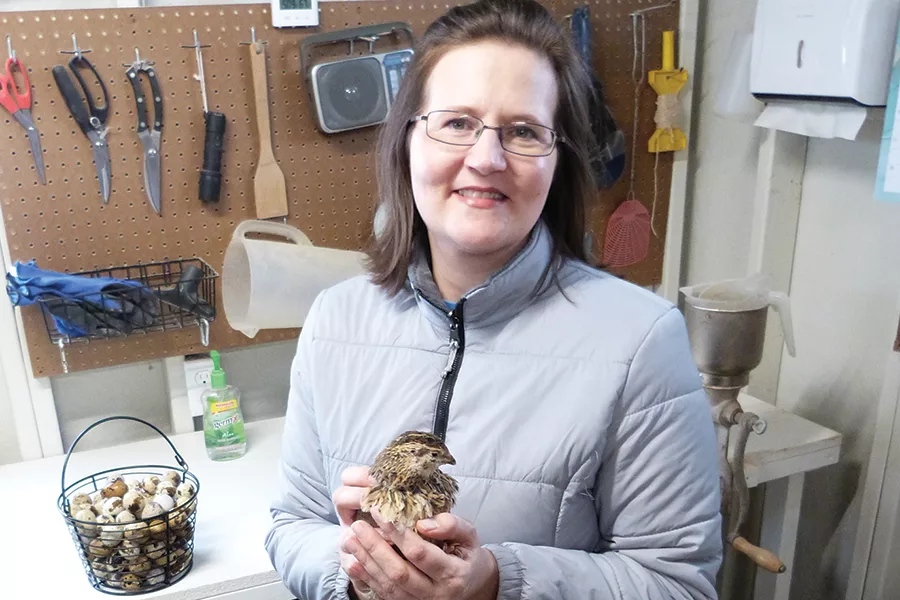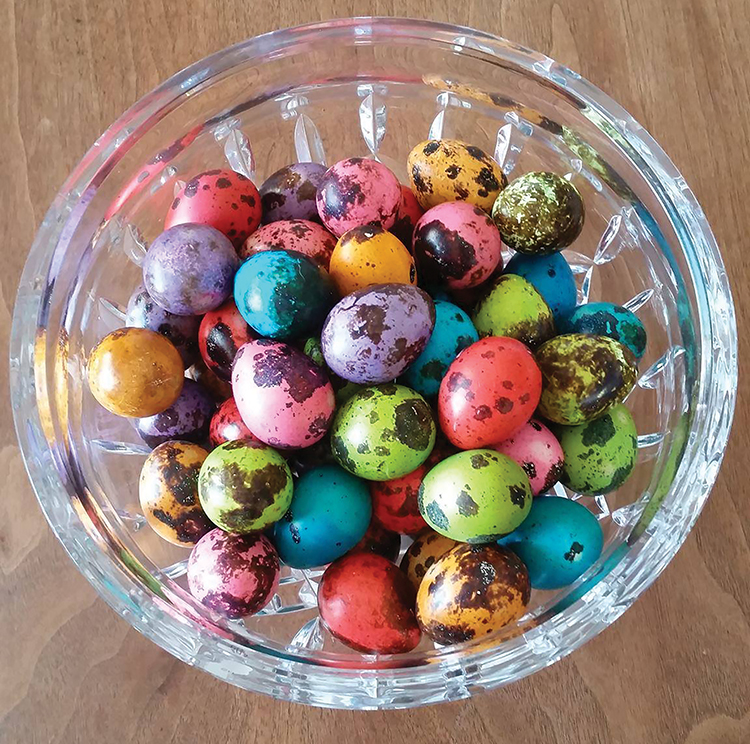
Home » Columbia Quail supplies bite-size alternative to chicken eggs
Columbia Quail supplies bite-size alternative to chicken eggs

March 15, 2021
Fancy a fancy quail egg?
A Pasco farm’s flock supplies them by the dozen to several Tri-City retailers.
These quail eggs don’t come from the kind of wild quail commonly seen around the Tri-Cities. The small, speckled eggs are produced by their larger cousin, the Japanese coturnix.
These quail look like a small female grouse and hail from east Asia. They’ve been raised around the world for centuries for their meat and eggs.
Carmen Kane, owner of Columbia Quail LLC, raises them locally with the help of her husband and four children.
They keep anywhere between 100 to 200 birds at a time for breeding and egg production, with each female laying 300 or more eggs per year.
“They’re very similar in flavor to a chicken egg, but richer and more decadent,” she said.
Seeking an alternative
Kane discovered quail eggs while searching for an alternative to chicken and duck eggs, which her children are allergic to.
“People are allergic to either the yolks or the whites – each contain different proteins,” Kane said, adding that while some people outgrow their egg allergies, others have them their whole lives.
“Some people are even sensitive to the birds’ diet – for example, if the birds are fed a soy-based feed,” she said.
Duck eggs, a common substitute for chicken eggs, have similar protein markers, so Kane’s kids still experienced allergic reactive symptoms.
Kane found some at Highlands Organic Market, but the store didn’t have a consistent supplier at the time, so she sought out backyard producers to supply quail eggs for the special-occasion recipes she wanted to make.
Though selling poultry eggs without a license is legal in Washington state as long as the eggs are sold on-location where they are laid, there are no other regulations or inspections required, so “it’s buyer-beware,” Kane said.
That’s when Kane, a stay-at-home mom and substitute for the Mid-Columbia Libraries system, decided to look into acquiring her own birds to supply her family with eggs, as she had previously kept a backyard flock of chickens.
Going into business
Seizing the opportunity to capitalize on a niche market, Kane applied for licensure in 2018 and partnered with Highlands Organic Market (HOM) in 2019 to begin providing customers a consistent supply of quail eggs.
Find Columbia Quail eggs at HOM’s locations at 101 Vista Way in Kennewick and 1769 George Washington Way in Richland, as well as Anything Grows at 1625 Columbia Park Trail in Richland. A dozen quail eggs retails for $5 or less.
Kane also sells eggs to area restaurants, though the Covid-19 pandemic put a damper on restaurant demand for the gourmet ingredient, she said.
“As far as I know, I’m the only non-GMO quail egg supplier in the area,” she said, noting that there is one other local competitor, but their birds are not fed a GMO-free diet. Kane said her quails’ diet is soy-free as well.
She said some Asian markets in the area carry quail eggs, but they are sourced from out of state.
“Worldwide, it is a pretty traditional egg,” Kane said. “In a lot of cultures, it’s the egg they grew up eating.”
She said some view quail eggs as a healthier option overall due to a richer mineral and amino acid chain profile that chicken eggs don’t have.

Quail or chicken eggs?
Though egg size is more variable among Japanese quail, Kane raises birds that lay jumbo-size eggs and said the recipe conversion is about three jumbo quail eggs to one chicken egg.
Columbia Quail LLC’s Facebook page (@ColumbiaQuailLLC) features regular posts of recipes using quail eggs – a few recent ones include egg drop soup, eggnog ice cream, deviled quail eggs and mayonnaise – as well as tips on how to crack the smaller-size eggs, as the technique differs from that of chicken eggs.
With spring weeks away and Easter coming, Kane is happy to report that despite their charming speckles, quail eggs can be dyed, either with a standard egg-dying kit or using naturally-derived dyes. She cautioned not to use too high of a concentration of vinegar though or leave them for too long in the vinegar bath since this will dissolve their speckling.
Future goals
Though Columbia Quail benefits from being in a niche market there are drawbacks.
“I definitely think my biggest challenge is bird management,” Kane said.
Though like chickens, Japanese quail can lay year-round with light supplementation in winter, their lifespan is one to three years and they consistently lay for only one year.
This short window translates to a lot of careful timing and logistics for Kane when it comes to breeding and hatching new birds, as well as managing flock size to accommodate market demand.
Though quail meat is consumed commercially and by local hunters going after native valley and mountain quail, Kane and her family don’t sell the meat, using it instead for personal consumption.
“Washington state is highly regulated, which makes it very difficult to sell the meat,” she said.
She also has to weigh the fiscal pros and cons of venturing into new market sectors.
She considered selling at a local farmers market but the cost of running a booth versus projected sales didn’t pencil out.
“Future goals would be to sell more regionally. I have stores interested, but it’s a matter of getting the eggs to them,” Kane said, pointing to additional expenses of licensing delivery drivers to transport the eggs, among other barriers and restrictions.
In the meantime, until demand makes expansion more economically feasible, Kane said, “I’m looking forward to restaurants getting back into the full swing of things so that one can find our eggs in restaurants more frequently.”
She welcomes wholesale inquiries.
Columbia Quail LLC: 509-380-7661; Facebook; [email protected].
Business Profiles Local News
KEYWORDS march 2021





